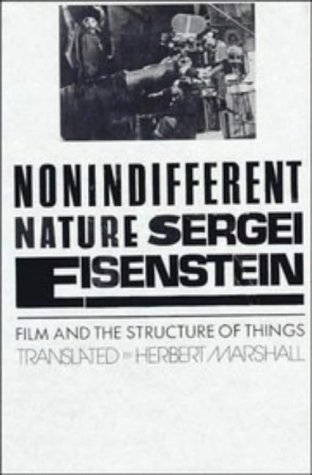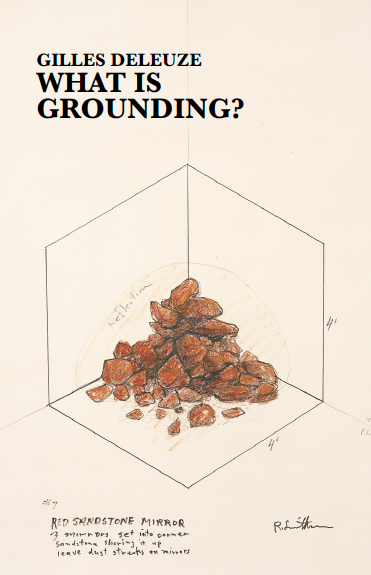Sergei Eisenstein: Nonindifferent Nature (1987)
Filed under book | Tags: · aesthetics, architecture, art, cinema, film, literature, painting, theory

“This is the first publication in English of Eisenstein‘s major theoretical work from the last decade of his life. Almost completed but unrevised at the time of his death in 1948, it comprises three articles from 1939-41 rewritten for the book, together with a substantial text from the period 1945-47. More than a treatise of film theory (though its immediate impetus is clearly the films that Eisenstein worked on at this time, Alexander Nevsky and Ivan the Terrible Parts I and II), Nonindifferent Nature aspires to the status of a contribution to general aesthetics, and its numerous examples are drawn more from the other arts than from cinema. Indeed, apart from analysing, in retrospect, his own work, Eisenstein scarcely touches on film at all. Instead he deals with the novel (Zola, Tolstoy, Wilkie Collins), painting (El Greco, Chinese landscapes), architecture (Chartres Cathedral, Mayan temples), etching (Piranesi), opera (Wagner), poetry (Pushkin), acting (Frederick Lemaitre), music (Bach, jazz), even cartooning (Saul Steinberg).” (from a review by Russell Campbell)
Translated by Herbert Marshall
Publisher Cambridge University Press, 1987
ISBN 0521324157, 9780521324151
xxv+428 pages
via jchill, land
Reviews: Ronald R. Levaco (Los Angeles Times, 1987), Russell Campbell (New Zealand Slavonic Journal, 1991).
PDF (Introduction missing, 7 MB, no OCR)
Comment (0)Aldo Rossi: The Architecture of the City (1966–) [IT, DE, EN, BR-PT, CR]
Filed under book | Tags: · architecture, city, design, history of architecture, neo-rationalism, theory, urbanism

“Aldo Rossi, a practicing architect and leader of the Italian architectural movement La Tendenza, is also one of the most influential theorists of the second half of the 20th century. The Architecture of the City is his major work of architectural and urban theory. In part a protest against functionalism and the Modern Movement, in part an attempt to restore the craft of architecture to its position as the only valid object of architectural study, and in part an analysis of the rules and forms of the city’s construction, the book has become immensely popular among architects and design students.”
First published as L’architettura della città, Padova: Marsilio, 1966.
English edition
Introduction by Peter Eisenman
Translation by Diane Ghirardo and Joan Ockman
Revised for the American Edition by Aldo Rossi and Peter Eisenman
Publisher Graham Foundation for Advanced Studies in the Fine Arts, Chicago; Institute for Architecture and Urban Studies, New York; and MIT Press, 1982
Oppositions Books series
208 pages
Reviews and commentaries: Adolf Max Vogt & Radka Donnell (Journal of the Society of Architectural Historians, 1983), Mary Louise Lobsinger (Journal of Architectural Education, 2006), Farida Nilufar (Protibesh, 2004).
L’architettura della città (Italian, 1966/2006, 137 of 235 pages, 3 MB, via)
Die Architektur der Stadt (German, trans. Arianna Giachi, 1973/1998, 6 MB, added 2015-7-18)
The Architecture of the City (English, trans. Diane Ghirardo and Joan Ockman, 1982, pages 20-27 & 164ff missing, 49 MB; OCR version added 2015-7-5 via Marcell Mars, 46 MB)
A arquitetura da cidade (Brazilian Portuguese, trans. Eduardo Brandão, 1995/2001, 83 MB, added 2015-6-30)
Arhitektura grada (Croatian, trans. Sanja Bingula, 1999, 5 MB, via Sara Renar, updated 2015-6-30; OCR version added 2015-7-5 via Marcell Mars, 20 MB)
Gilles Deleuze: What Is Grounding? (1956-57/2015) [FR, EN]
Filed under book | Tags: · philosophy, theory

“What is Grounding? is Gilles Deleuze’s first seminar, and is distinguished in that, rather than “taking an author from behind and giving him a child that would be his offspring, yet monstrous”, the work focuses instead on the question of grounding, defined both as “the sufficient reason for concrete entities”, and “the point of departure for philosophy”, in translator Arjen Kleinherenbrink’s terms. Rather than foregrounding method, in which human subjective experience remains primary, here Deleuze affirms the centrality of system, of things and the relations between things.”
Translated, introduced, and annotated by Arjen Kleinherenbrink
Edited by Tony Yanick, Jason Adams & Mohammad Salemy
Publisher &&& Publishing, Grand Rapids, MI, 2015
Mémoires involontaire series, 1
Creative Commons BY-NC-SA 4.0 International License
ISBN 9780692454541
185 pages
Qu’est-ce que fonder? (French, 1956-57, HTML)
What is Grounding? (English, 2015, PDF)

